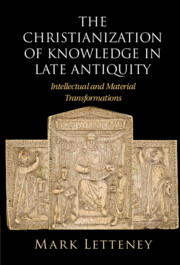“Mark Letteney’s book approaches the question of the rise of Christianity in the late Roman Empire through a new perspective: not the more traditional one of Christianizing people, doctrinal controversies or demographic changes, but that of knowledge structures. The book is characterized by a particularly careful exegesis of the sources and a very extensive comparison with the earlier literature. It stands out for its great originality and is an uncommon example of how productive research in Late Antiquity can be given the aptitude for capturing the echoes that can come from texts of diverse origins.”
“Letteney’s remarkable new book charts the impact of Christianity not on religion or institutions – the focus of so much work on early Christianity – but rather on the organization of knowledge and the production of meaning in Late Antiquity. Drawing on a range of specialized texts (law codes, technical and bureaucratic treatises, military handbooks, and so on), he demonstrates that the particular forms of meaning-making that emerged in the context of theological and doctrinal dispute became broadly generalized in late-antique thought, and could be found in everything from the writings of the jurists to the Palestinian Talmud. A compelling and sensitive new sociology of knowledge, The Christianization of Knowledge in Late Antiquity will be required reading for students of early Christianity and the cultures of Late Antiquity, and will also be of interest to everyone working on the production of knowledge in premodern societies more generally.”
“Mark Letteney has produced a remarkable book that seeks to answer a question of relevance still today: What difference did Christianity make to Rome? Letteney contends that the fourth century was not a time of pagan–Christian conflict, nor a simple transition from a Roman to a new Christian empire, but rather a period of rupture as well as creative construction in the very ways in which fourth-century Nicene Christians made arguments and conveyed knowledge. These changes were promoted by the emergence of the codex and of new tools of Christian scholarship that promulgated a novel and long-lasting late antique book-oriented culture. Drawing on Roman law, ancient technical treatises, Christian theology, and Rabbinic texts, Letteney shows the development of this shared book culture and new scholarly practices that gradually permeated the empire and transcended religious differences as Nicene Christians emerged in the late fourth century in positions of power as the new elite of Rome. Letteney’s book thus provides original and thoughtful insight into why the Christianization of Rome matters to intellectual as well as religious history.”

